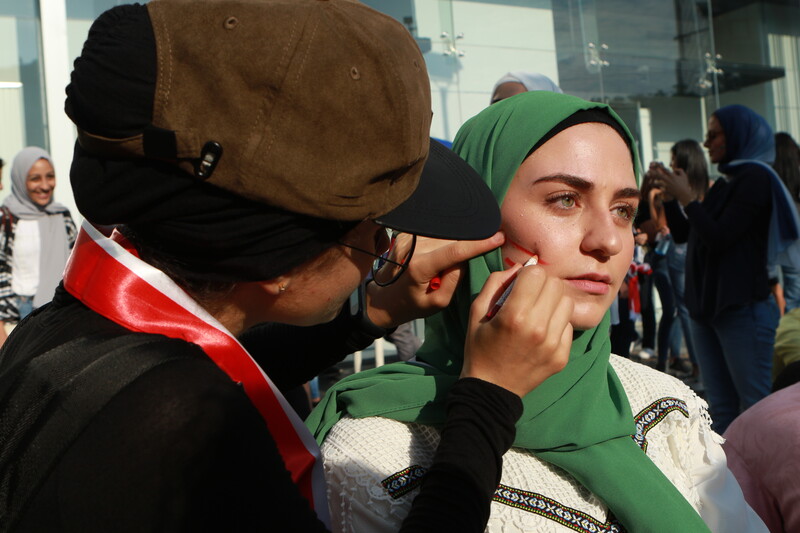The Electronic Intifada 5 November 2019

A protester in Riadh al-Solh Square in Beirut holds a sign saying: “I can’t hold my mother’s citizenship but I can support her revolution.”
In Elia Square in the southern Lebanese city of Sidon, Nashwa Hammad last week stood holding a Palestinian flag in one hand and a Lebanese in the other. The freelance journalist was chanting alongside her Lebanese friends.
“I am one of very few Palestinians on these protests. But my mother is Lebanese, that makes me Lebanese as much as Palestinian,” Hammad, 26, told The Electronic Intifada. “I have lived my entire life in Lebanon. I was in Lebanese schools. And I never lived in refugee camps. What more does it take to be Lebanese?”
As thousands of Lebanese flood public squares in big cities, the role of the country’s many different communities will be closely scrutinized. Among those communities are Palestinian refugees, so often a lightning rod for sectarian tensions in Lebanon.
This is especially true as the protests enter a critical stage after the resignation, on 29 October of Saad Hariri, the country’s prime minister.
But this time, perhaps, communitarian strife is harder to whip up.
The demonstrations erupted after a series of legislative measures to impose new taxes, including one that would have levied a charge to use WhatsApp on cellphones.
A week before those proposals were made in parliament, the country faced fuel and bread shortages. Together, these proved the final straw for a population tired of government mismanagement.
Thus the protests, directed as they are against official corruption and incompetence, have united communities that in Lebanon have traditionally been seen as estranged.
Staying cautious
Some chants were directed at Gebran Basel, Lebanon’s foreign minister and head of the Lebanese Free Patriotic Movement.
Basel was widely derided as racist in the summer over tweets that seemed to encourage Lebanese employers not to hire Palestinian or Syrian refugees.
“Basel out, out!” protesters chanted, in support of more rights for Palestinian and Syrian refugees in Lebanon. “Refugees in, in!”

The focus on official corruption and incompetence has united communities in support of the protests in Lebanon.
“Whatever affects the Lebanese people affects us too. Corruption, sectarianism and inequality harm all of us,” Hammad said. “My father has a Palestinian travel document issued from Egypt. I have to renew my permit in Lebanon every few months. But my mother is Lebanese. I am not even asking for a Lebanese citizenship, even though I believe it should be every woman’s right to pass on her citizenship to her kids.”
Ghassan al-Naji, 29, was in Martyrs’ Square in Beirut on 26 October with his Lebanese wife Mariam.
“I am here to support her and her cause,” Ghassan, a social worker, said. “We have been coming here nine days in a row now.”
Mariam al-Naji, 25, who is from Beirut, explained why participating in the protests was so important for her.
“My boy will grow up in this country and will have no rights whatsoever only because his father is Palestinian. This is not fair.”
Nevertheless, in the refugee camps, Palestinians have largely decided to keep themselves away from the demonstrations.
“We absolutely support the Lebanese people in their demands.” said Ahmad Safadi, 55, a taxi driver from Burj al-Barajne camp. “But we cannot be part of their uprising. Given our history in Lebanon, some Lebanese parties that are against the uprising would use us as an excuse to sabotage the protests.”
Moments of joy
There have been exceptions to this rule. On 20 October Samir Geagea, head of the Maronite Christian Lebanese Forces party announced the resignation of his ministers from the Lebanese government in response to the protests.
These included the minister of labor, Camille Abousleiman, notorious in Palestinian refugee camps for having taken a hard line on preventing the employment of refugees.
In July, people saw labor ministry billboards erected that warned – or perhaps urged – entrepreneurs that “your business moves forward only by the hands of your country’s sons.”
News of his resignation was therefore met with a celebratory march on 20 October at the Ein al-Hilweh refugee camp.

Lebanon’s protest movement is now facing a critical moment after the resignation of PM Hariri.
Samia Hussein, 49, participated in that march with a mixture of glee and relief.
“Of course, we are going to celebrate his resignation. Abousleiman wanted to prevent all of us from working in Lebanon. Now he is the one who lost his job,” Hussein, a homemaker, said laughing.
Nevertheless, she urged caution on her fellow camp dwellers.
“My heart is loaded with hope seeing all these people demanding reforms, but I am not allowing any of my children to participate. We have to be prudent. We do not want the scenario of Palestinians in Syria to be repeated.”
Hussein said Palestinians in Lebanon are stereotyped as subversives.
“This is why we support [the protesters] from inside our camps. I am happy that young women and men are aware of this and are not participating. Maybe some Palestinians are but they are mostly Palestinians from outside the camps, who are entirely submerged in Lebanese society.”
Amena ElAshkar is a journalist and photographer based in Burj al-Barajne refugee camp in Beirut.





